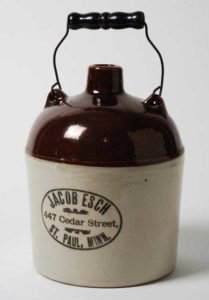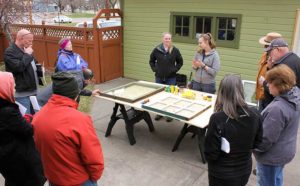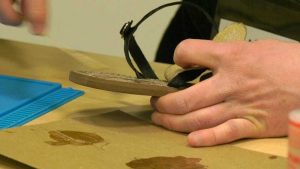Events
 hat follows is a list of upcoming events of interest to members of the Twin Cities Bungalow Club. Some are sponsored by the Bungalow Club and some are not.
hat follows is a list of upcoming events of interest to members of the Twin Cities Bungalow Club. Some are sponsored by the Bungalow Club and some are not.
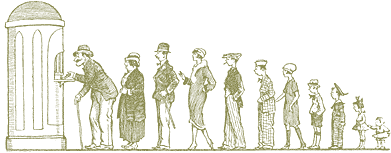
Ramsey County Master Gardeners Plant Sale
Aldrich Ice Arena
1850 White Bear Ave., Maplewood
ramseymastergardeners.org/plantsale
The annual Ramsey County Master Gardeners Spring Plant Sale features a large selection of plant varieties. The sale offers shoppers hundreds of plant varieties. There is something for everyone.
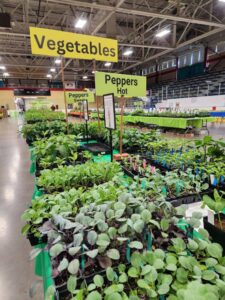 Native plants (for sun and shade; wet and dry soils)
Native plants (for sun and shade; wet and dry soils)- Annual flowers for containers and garden beds
- Vegetable favorites (including favorite tomatoes)
- Culinary herbs
- Perennial landscape plants, such as hostas
- Common and unique houseplants
Gardening supplies such as high-quality garden gloves, plant tags, stepping stones, birdhouses,. and garden tools for kids are also offered.
Ample, free lot parking is available. Funds raised support Master Gardener community and youth education programs in Ramsey County.

Twin Cities Bungalow Club Presents:
Wastewater in the Bungalow Era
A Presentation and Private Tour
of the Metropolitan Water Resource Recovery Facility
A members only event
Wednesday, June 18, 2025
6:30 to 8:30 p.m.
Metropolitan Council Water Resource Recovery Facility
2400 Childs Road, St. Paul
For Bungalow Club members and their guests (18 and older)
Registration required by Sunday, June 15, at tinyurl.com/bdftvuk8
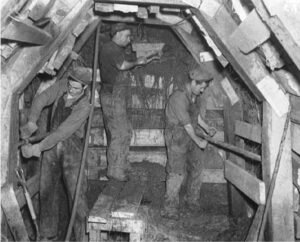
Building a sewer under Cedar Street in St. Paul, c. 1910.
Just like today, the original occupants of our bungalows enjoyed all the sanitary conveniences of modern life—their gleaming white toilets, sinks and bathtubs efficiently whisked away household wastewater and its attendant germs and odors. Life in a bungalow was good.
But beyond these newly-built neighborhoods, a different reality had coagulated. As wives relaxed with needlepoint and husbands puttered at basement workbenches, Minnesota’s waterways were the filthiest they had been at any time throughout human history.
Cities such as Minneapolis and St. Paul had struggled with sewage disposal since they were established. Throughout the late 19th and early 20th centuries, typhoid outbreaks were common, each resulting in thousands sickened and scores of deaths.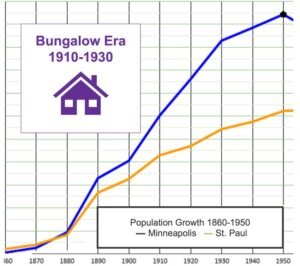
But the building boom leading up to and including the bungalow era tipped the Twin Cities into a new level of crisis. The region had 80 major outlets dumping raw sewage into waterways. Enormous, floating mats made up of millions of cubic yards of sewage and scum churned on the river between Minneapolis and St. Paul. A 1926 survey of a 42-mile stretch of the Mississippi downriver of St. Paul turned up just three living fish.
That year, civic leaders and the Minnesota Legislature began to address the issue in earnest. Guidelines for improving water quality were established, and by the early 1930s, construction began in St. Paul on the first wastewater treatment plant built on the entire Mississippi River.
This June, Bungalow Club members will be able to tour the modern, state-of-the-art version of the Metropolitan Water Resource Recovery Facility. It is the 10th largest wastewater treatment plant in the nation, treating 65 billion gallons per year.
Participants who take the walking tour will view portions of each stage of wastewater treatment, culminating in a view over the channel in which fully treated water—at this stage cleaner than the Mississippi itself—flows back into the river.
Registration Process—Please Read Carefully
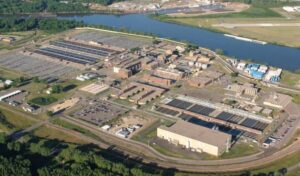
Aerial view of the Metropolitan Water Resource Recovery Facility.
This event is open only to adult (18 and older) members of the Twin Cities Bungalow Club and their adult guests. Members with an “individual membership” may invite one guest. Those with a “household membership” may invite two. Total capacity for the event is 60 people. If the event is full when you attempt to register, your name and contact information will be added to a waiting list, and you will be contacted if slots open.
Please register at tinyurl.com/bdftvuk8. Registration closes on Sunday, June 15, at 11:59 p.m. If you register and later must cancel, please notify the Bungalow Club by sending a message to mail@bungalowclub.net or leaving a message at 612-724-5816.
Wastewater treatment plants are part of the nation’s critical infrastructure (tinyurl.com/42vdz93p). Therefore, everyone visiting the wastewater treatment plant must be cleared through a standard security review process prior to arrival. This step is part of the registration process.
On the day of the tour, all participants must bring proof of identity in the form of a government-issued photo identification card (driver’s license, state-issued ID, passport) that matches the name(s) provided on the registration form. It will be checked against the approved tour participant list.
Event Options
Each participant must opt for one of the below when filling out the registration form.
- Option A: Presentation and Walking Tour (two hours total). This option begins with an illustrated presentation in a conference room, followed by a walking tour of the facility. All participants must be able to walk and stand for approximately two miles.
- Option B: Presentation Only (45 minutes total). This option includes an illustrated presentation in a conference room with seating.
Note that for safety reasons, all participants choosing either option must wear sturdy shoes or boots that completely cover their feet (no open toes) and clothing that completely covers their legs. No one will be admitted unless they meet these dress requirements.
Important Transportation Information
If your group includes people who will only attend the presentation while others will attend both the presentation and walking tour, consider arriving in separate vehicles. The presentation will end 1.5 hours before the walking tour. This means people who attend only the presentation will be required to leave the facility or wait in the conference room until the walking tour concludes.
An Introduction to Hennepin County
Hennepin History Museum
2303 Third Ave. S., Minneapolis
Adults $8; students/seniors $5
Free for museum members
612-870-1329
hennepinhistory.org/avada_portfolio/an-introduction-to-hennepin-county/
This exhibit consists of six main panels, covering topics from Hennepin County’s pre-settlement home of the Dakota; the establishment of the County in 1852; the rise of local industry; and the diverse immigrant populations that moved here.
Red Wing Pottery Exhibition and Event
Tuesday – Saturday, 10 a.m. to 4 p.m.
Sunday, 10 a.m. to 3 p.m.
Pottery Museum of Red Wing
240 Harrison St., Red Wing
Admission free
Call ahead for group tours (5 or more, $3 per person)
651-327-2220
potterymuseumredwing.org
There is nothing better than spending a day in Red Wing, Minnesota. While you are there, stop in at the Pottery Museum of Red Wing. The museum houses more than 6,000 vintage pieces of artisan-crafted stoneware, art pottery, dinnerware and folk art.
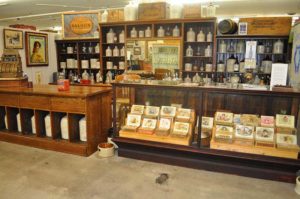 Currently on view is a special exhibition: “The Red Wing Saloon.” This exhibit shows what a saloon looked like prior to January 16, 1920, when the 18th Amendment to the U.S. Constitution was passed, prohibiting “intoxicating liquors” in the U.S.
Currently on view is a special exhibition: “The Red Wing Saloon.” This exhibit shows what a saloon looked like prior to January 16, 1920, when the 18th Amendment to the U.S. Constitution was passed, prohibiting “intoxicating liquors” in the U.S.
See how liquor was dispensed from advertising jugs produced by Red Wing companies for businesses throughout the country. (In one month alone in 1910, the pottery shipped more than 6,400 jugs.)
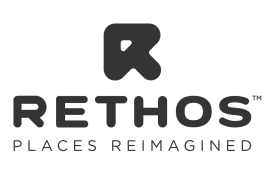 Classes Offered by Rethos
Classes Offered by Rethos
Preservation Alliance of Minnesota (PAM) has a new name—Rethos—and a greatly expanded ambition. The organization has reinvented itself as a nationwide organization that strengthens communities within the context of historic spaces. Rethos is focused on finding new uses for historic buildings of all types by offering educational programs; coordinating Main Street programs in rural cities; advocating for public policies that bolster historic properties; and fostering investment partnerships to save historic buildings. For a full description of the new organization, visit: www.rethos.org/whynowhyrethos
One of Rethos’ goals is to build a community of homeowners, craftspeople, DIYers, realtors, and anyone who cares about (or cares for) old buildings. Hands-on workshops and classes connect you to the tools, skills, and experiences you need to take good care of the places you love.
Bungalow Club members will be especially interested in the Homeowner Workshops. Classes vary but typical topics are window repair including wood rot; leaking pipes and clogs; how furnaces and boilers work; and kitchen cabinets and countertops. Check the Rethos website for the listing of upcoming classes and workshops.
Fix-It Clinics
Get help with your broken stuff and learn valuable repair skills at free Fix-It Clinics. Currently, one-on-one virtual repair sessions with volunteers are available. Check online for the process to sign up.
Fix-It Clinics offer free, guided assistance from volunteers with repair skills to disassemble, troubleshoot, and (hopefully) fix small household appliances, clothing, electronics, mobile devices and more. Fix-It Clinics teach valuable troubleshooting and basic repair skills, build community connections and reduce the number of repairable items that are thrown in the trash.
Contact Nancy Lo at nancy.lo@co.hennepin.mn.us or 612-348-9195 with questions or to volunteer.
Ramsey County Fix-It Clinics
www.ramseycounty.us/residents/recycling-waste/education/fix-it-clinics
Fix-it Clinics were canceled in 2020. Check their website for updates or call 651-266-1199.









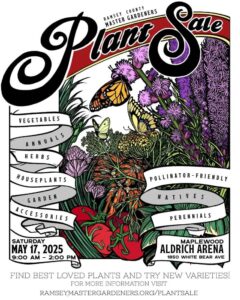
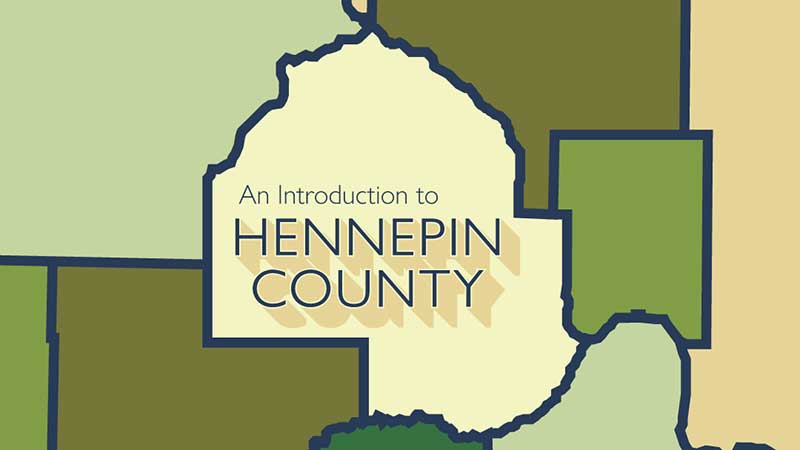 An ongoing exhibit
An ongoing exhibit 